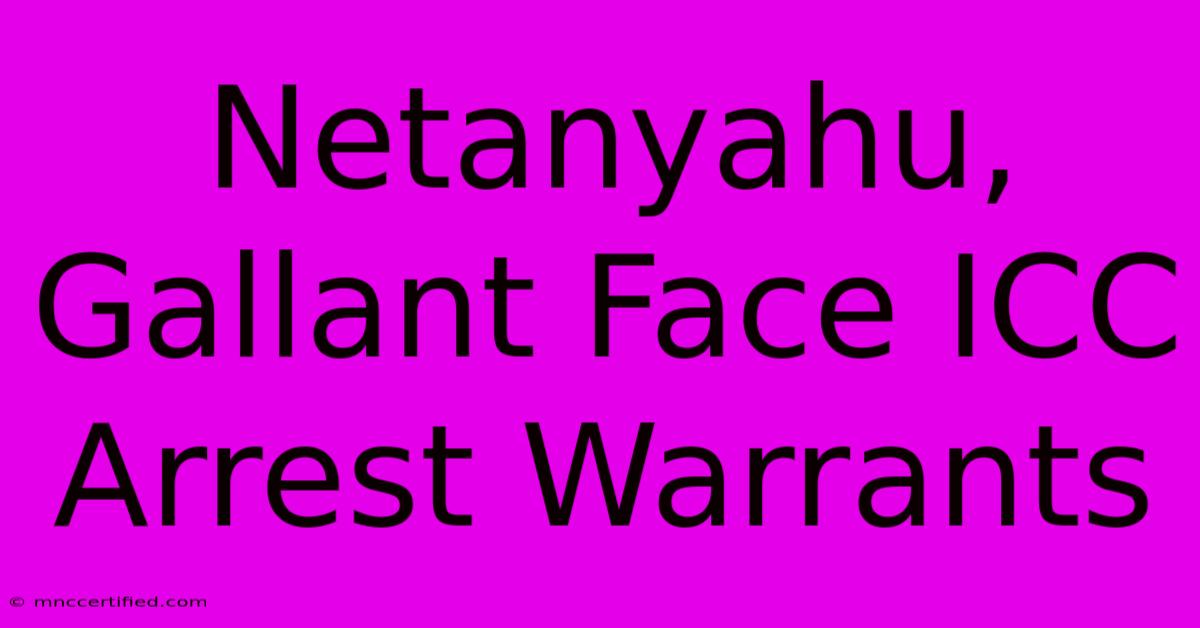Netanyahu, Gallant Face ICC Arrest Warrants

Table of Contents
Netanyahu, Gallant Face ICC Arrest Warrants: A Deep Dive into the International Implications
The recent issuance of arrest warrants by the International Criminal Court (ICC) for Israeli Prime Minister Benjamin Netanyahu and Defense Minister Yoav Gallant has sent shockwaves through international relations. This unprecedented move by the ICC, alleging war crimes in the occupied Palestinian territories, demands a thorough examination of its implications for both Israel and the global community. This article will delve into the specifics of the warrants, the legal arguments surrounding them, and the potential consequences for regional stability.
Understanding the ICC's Jurisdiction and the Allegations
The ICC's jurisdiction is based on the Rome Statute, an international treaty ratified by many nations but notably not by Israel. However, the ICC asserts jurisdiction based on the principle of territoriality, claiming its authority extends to the occupied Palestinian territories, where the alleged crimes are said to have occurred. The warrants allege that both Netanyahu and Gallant bear responsibility for war crimes committed during the Israeli military operations in the West Bank and Gaza Strip. The specifics of these allegations remain under scrutiny, focusing on potential violations of international humanitarian law, including disproportionate use of force and targeting of civilians.
Key Allegations Against Netanyahu and Gallant
While the exact details within the sealed warrants remain undisclosed, media reports and legal analysts suggest the allegations revolve around:
-
Policies enabling unlawful attacks: The ICC is likely investigating whether policies implemented during Netanyahu’s and Gallant's tenures led to unlawful attacks on Palestinian civilians and infrastructure. This includes examining the proportionality of military responses and the adherence to the principles of distinction between combatants and civilians.
-
Failure to prevent or punish war crimes: The warrants may also allege a failure of leadership to prevent or prosecute those responsible for alleged war crimes committed under their command. This is a crucial element of command responsibility under international law.
-
Settlement expansion and its impact: The ICC might be investigating the ongoing expansion of Israeli settlements in the occupied Palestinian territories, arguing that this constitutes a war crime under certain interpretations of international law.
Israel's Response and the International Backlash
Israel has vehemently rejected the ICC's jurisdiction and the warrants themselves, characterizing them as politically motivated and biased. The Israeli government has accused the ICC of anti-Israel bias and has refused to cooperate with the investigation. This stance is supported by several countries, primarily Israel’s allies, who view the ICC’s actions as an overreach and a threat to state sovereignty.
The Diplomatic Fallout
The warrants have inevitably strained relations between Israel and several countries that are signatories to the Rome Statute. This situation necessitates a careful examination of diplomatic strategies. Some countries are likely to express concerns about the ICC's actions, while others may offer support to the Palestinians. The potential for increased international isolation of Israel, or conversely, increased international condemnation of the ICC, is a significant concern.
Potential Consequences and Future Outlook
The implications of these warrants are far-reaching. The potential arrest of a sitting Prime Minister, even if unlikely in the near term, would represent an unprecedented challenge to international norms and could escalate tensions in the region.
Legal Challenges and International Pressure
The ICC's decision will undoubtedly face numerous legal challenges. Israel's refusal to cooperate and the complexities of international law will likely lead to protracted legal battles. The international community will face pressure to either support the ICC's assertion of jurisdiction or challenge its actions, creating a significant geopolitical dividing line.
Implications for the Peace Process
The current situation throws a considerable shadow over any potential resumption of Israeli-Palestinian peace negotiations. The lack of trust and the heightened tensions exacerbated by the warrants create a considerable obstacle to any meaningful dialogue. The focus now shifts to managing the immediate fallout and potentially exploring diplomatic avenues for de-escalation.
In conclusion, the issuance of arrest warrants for Netanyahu and Gallant marks a significant turning point in the Israeli-Palestinian conflict and international relations. The ensuing legal and political battles will significantly shape the future trajectory of the conflict, demanding careful diplomatic navigation and a nuanced understanding of the complex interplay between international law and national sovereignty.

Thank you for visiting our website wich cover about Netanyahu, Gallant Face ICC Arrest Warrants. We hope the information provided has been useful to you. Feel free to contact us if you have any questions or need further assistance. See you next time and dont miss to bookmark.
Featured Posts
-
Can A Tenant Insure The Building
Nov 22, 2024
-
Boba And Toast At Hey Bobo Cafe
Nov 22, 2024
-
Penn State Sorority Lifes Impact
Nov 22, 2024
-
Piers Attacks Ellens Show Ending
Nov 22, 2024
-
Whiteheart Elevated By Browns
Nov 22, 2024